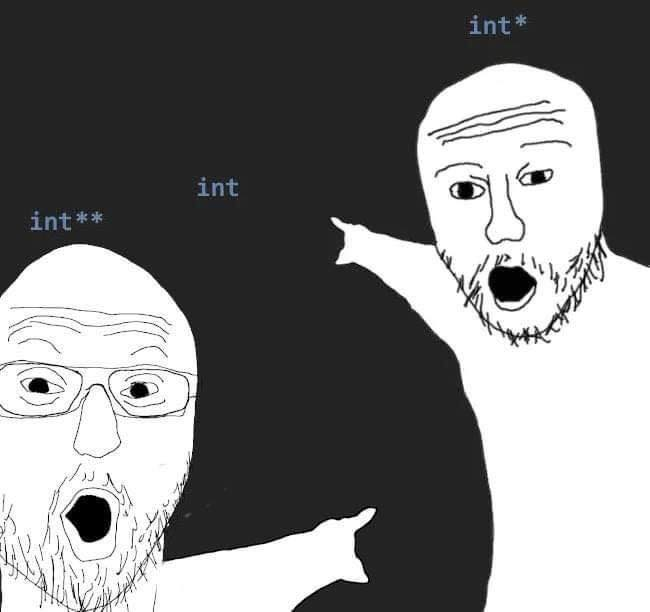- cross-posted to:
- anarchism@lemmy.ml
- anarchism@slrpnk.net
- foss
- anarchism@lemmy.dbzer0.com

The idea of free software is extremely socialist/communist. People working together to create something that anyone can use for free, with profit being a non-existent or at least minor motivator.

It’s a real shame that generally lefties don’t really care about or ‘get’ software freedom. You should be pushing for free software on all levels. In your personal life and in government. It’s crazy how much power a company like Apple, Microsoft or Google has over everyone.

I was leftie before I was techie. If you don’t know anything around tech and computers you wouldn’t know what to do. Even as a fairly tech-adjacent professional it took me quite a while.
Then again, I only became a real leftie again after kicking all the corpos out of my computer.
Tech used to be (and still is) obscured by heavy gatekeeping. We who understand a little more like to joke about those who don’t, and I guess we’ll have to stop that if we really want to unite the left. Don’t ridicule, explain. The person might never have had a chance to learn the concept.

There’s definitely a gatekeeping issue, but free software doesn’t automatically mean ‘force people to use Linux’, there’s stuff like Firefox, Libreoffice, Nextcloud, etc.
It’s things like councils working together on common software platforms instead of going with commercial vendors, supported by local companies instead of shoveling billions to Google and Microsoft that gets sent overseas immediately. It’s federal governments hiring developers directly to work on software instead of using commercial vendors.

It’s pretty hard to fight hegemony when your salary is just built on donations. A lot of important tech is also paid for via government grants then the private sector gets to use it and erect the walled gardens when it should be in the commons.

Most big projects survive on more than just donations. The Linux kernel is developed by developers paid by some of the biggest software corporations.

Well, there is also a more right leaning take. You take care of your self and scratch your own itch, and you should not be a liability to the society, but make your self useful and contribute back. And I think this is kind of the reason FLOSS works well, it can be aligned with many philosophies.

You didn’t write the kernel, write the libraries, or write the user space applications, did you? No, Linux is the product of a collaborative group of strangers working towards the same goal, a goal that largely doesn’t include any considerations for profit. You haven’t pulled yourself up by your boot straps to make Linux. Hell, even Linus didn’t do that. It’s the product of thousands of people working on it over decades. It’s not capitalist, it’s not individualistic, Linux is communal.

TIL: I must be a communist/socialist/leftist/whatever for supporting FOSS. What’s next? Marxism/Leninism? Or maybe I missed that stop, while riding the communism train. Then again, I’m already on Lemmy, so I must be into ML as well, right?

You can support communist/socialist policies without being a tankie. Most rational leftists do. And yeah, if you support FOSS you support a socialist idea. Same if you support public healthcare, public education, or libraries.

Just because an idea is labeled as socialist/capitalist or whatever, doesn’t inherently make it good or bad. People like to label things to simplify complicated topics, but that shortcut isn’t always worth it. Nowadays, I hear a lot of talk about this or that being socialist/communist thing as if that makes it automatically bad. Somehow, I get the feeling that most of those people are Americans. If that’s actually true, it would make a lot of sense.

I don’t think we disagree. Just thought it was interesting how closely FOSS ideas match those of communism and socialism, even though a lot of people probably don’t view it that way.

Yes, that’s the fascinating thing. Using labeling as a mental shortcut for understanding the world is really useful, but it comes with a price tag.
It’s basically the same problem we have when labeling thins as “religion” or “some other stuff”. We might want to call something a religion, but it doesn’t quite match. We might want to label something else a non-religion, but it meets all the criteria. Those labels aren’t neutral either, so using them comes with some baggage.
Same thing with FOSS. If we label it a socialist concept, that label comes with some unfortunate connotations… Well, at least if you’re in a country where socialism is frowned upon.

Or just think for yourself and have your own opinions about issues instead of signing up for an entire ideology.

Yep. This is the way, but it won’t stop other people from labeling you regardless.

No one is labeling you. Though you should perhaps reflect on the world around you and maybe see that adhering to an ideology is actually just applying philosophy comprehensively to all layers of society at the same time.

The idea of free software isn’t political; ie socialist/communist. Free software is also compatible with free market capitalism. In a capitalist market free of coercion there is nothing that stops one from copying something then changing and/or selling it.
If you make a microwave and I buy one and reverse engineer it then I could produce and sell it just fine. Similarly, if you created a program called Adobe Photoshop, and I got a hold of the code, then I could copy and resell it. Neither capitalism nor the free market has a concept of patents or copyrights which are a political thing. Everything is free to reproduce.
Making the software free is just the logical economic price of a product with a marginal cost very close to zero. Give it away and let everyone build on top of it to make increasingly better things because that is the most efficient way to manage those resources. It’s like the progression of science. We give credit for discovery, but encourage all science to happen in the open so others can take the ideas and build on them without being encumbered.
I hope you don’t think that science is socialist/communist.
Note: After going through the trouble of writing this I became concerned that my use of the loaded term “free market capitalism” could be misunderstood so I’ve decided to define my terms. Free market capitalism isn’t a form of government. Capitalism just means stuff can be privately owned. A market is how capital is coordinated. The free refers to the market transactions being voluntary/free of coercion. So free market capitalism is the “voluntary coordination of private capital”. That definition can exist under varying forms of government which is why I argue that it isn’t a political system in itself.

Capitalism just means stuff can be >privately owned
This is the antithesis of free software. FOSS can not be owned. Patents and copyright are essential to capitalism. You are not allowed to copy and redistribute Adobe Photoshop, nor the music of your favorite band, movies, books, etc etc

This isn’t really correct. Free Open Source Software is very much owned. It is just that the owner doesn’t charge for it, has stated that there are rules for use and modification of the software. FOSS was a clever trick that used copyright against itself. It is was a really brilliant trick, but that trick was only necessary because copyrights exist in the first place. If copyrights didn’t exist then it wouldn’t be illegal to redistribute Adobe Photoshop.
You may argue that copyrights are necessary for the betterment of society, but that is debatable. The biggest case against copyright being necessary is, in fact, the FOSS movement. It proves we don’t actually need companies like Adobe to make all our stuff and charge a lot for it.

Free software subverts some of the rent seeking barriers put in place by capitalists (copyright and patents, both are enforced by government). I agree that a real free market wouldn’t have those things, but capitalists don’t want a free market, they want to capture the market and extract as much profit out of it for the least amount of effort.

My problem with what you said is that it isn’t just capitalists that use patents and copyrights. Russia and China have patents and copyrights. It isn’t limited to capitalists, and saying so confuses people on what the actual issues are.

Russia hasn’t been communist since 1991. Not sure what the copyright regime was in the old Soviet Union. As for China, they’ve implemented a bunch of capitalist concepts in order to interface with the wider capitalist world (as part of trade agreements, they decided to honour copyright and patents in order to be able to sell us stuff).
Just because a nominally communist country (and you can definitely argue about that in China’s case) does something, that doesn’t mean that that thing is automatically either communist or capitalist.

Relevant Section under Gift economies:
The expansion of the Internet has witnessed a resurgence of the gift economy, especially in the technology sector. Engineers, scientists, and software developers create open-source software projects. The Linux kernel and the GNU operating system are prototypical examples of the gift economy’s prominence in the technology sector and its active role in using permissive free software and copyleft licenses, which allow free reuse of software and knowledge.
Essentially the line of thought is that open source software is an example of mutual aid and the gift economy.

I thought it was an autonomous collective.

Listen, strange penguins biting people is no basis for a system of government.

Supreme executive power derives from using sudo, not some farcical user account control.

Come and see the kernel inherent in my system.

I mean, if I went 'round saying I was a sysadmin just because some angry Finn lobbed a scimitar at me, they’d put me away

Isn’t it a benevolent dictatorship with Linus at the head?

Linus’ power doesn’t come from Ownership, but respect. Anyone can fork it and do what they want, but because Linus is respected, everyone else follows suit.
Anarchism would function in a similar manner, it wouldn’t be a bunch of opinionated people doing whatever they want, but people generally listening to experts who don’t actually hold systemic power.

Problem is that the average person cannot discern between an actual expert and a charlatan.

And yet Linux works fine. Not everyone needs to be a dev, devs can tell the difference between an expert and a charlatan.

I meant that as a reply to the second paragraph which generalised anarchism; including the non-Linux world.
I also disagree that this isn’t an issue in the broader Linux community however. See for example the loud minority with an irrational hate against quite obviously good software projects like systemd who got those ideas from charlatans or “experts”.
I know, I used Linux as an example. Just like not everyone needs to be a weatherman to trust weatherman that can recognize experts among themselves, so too can engineers recognize experts among themselves, and so forth.

I would disagree and say it’s more akin to a philosopher king hence less anarchy and more monarchy. It’s all good until the king dies and let’s see who succeeds them.
It will be most telling when Linus dies.

No, a king’s power derives from authority, not from the good will of its subjects

See and I see it more as in modern times where it’s a simple figurehead.

But a king must have power and authority, Linus just has influence and labor, thus expertise.
You can fork it, sure Linus is very respected and his decisions are considered very important but you can fork it and change however you want so it’s still compatible with Anarchism.

Free software doesn’t have owners. If someone else did a better job of being the “benevolent dictator” of a fork of Linux, everyone would start using that fork. Arguably this is a more free-market system than non-free software.

Youre thinking of python I reckon -link to wikipedia

The article you link literally lists Linus under the referent candidates section.

So I did miss that Linus is in the article, but the reference to him says he was awarded the title, which makes it sound like an honour rather than a hierarchical system. I don’t believe that he’s ever been anything other than the projects owner/founder but I’m happy to learn if I’m wrong.

Yes, that’s just how open source works. Of course they always serve at the pleasure of the community, otherwise forks would happen. Nobody said otherwise. As the “Usage” section of that article implies, the “benevolent” bit comes from the feedback loop of a happy community supporting their dictator-for-life.

I mean how the community refers to him. I’ve never read a thread where someone called Linus a BDFL, I have with python. If they do, they do. Just haven’t seen it myself.

I’m worried we’re gonna have a situation like the death or Tito

sudo apt install anarchismis a real command in Debian.
What does it install?

anarchism would be my guess.

Cory Doctorow has a book, “Walkaway” that is basically exploring the politics of FOSS on a societal scale. It’s pretty nerdy obv but I enjoyed it and it doesn’t overly glamourize any political system the way you’d typically see in political fiction.

There’s a book called Opt-Out from Rory Price about a future where humanity starts using AR more and more to the point that it’s almost obligatory to have a device of this kind for everything, even as ID. It then talks about a group that develops a free/libre version of this device’s OS and they have to decide about personal issues or try to maintain their views. It’s entertaining and not too long, but I think it shows a very possible future.
I haven’t heard from its author in some time, but I think they discovered they were someone else too ;), that’s why I love this book.

I mean…yeah

Idk, technically voluntary association is a key tenet of volunteerism/anarcho-capitalism, so if we’re just using volunteering as the basis we might as well say it’s volunteerism. I think anarcho-communism and anarcho-capitalism are a bit more nuanced than “sharing.”

Anarcho-capitalism is a contradictory term that is mostly used to imagine neofeudalism.

mostly used to imagine neofeudalism
what else is it used for?

Those advocating for it also use it to display their total lack of perspective and analysis of the mechanics of capitalism. I.e. one can use it as a sign on one’s head saying “not at home for the moment, try again later”.

Anarcho-Capitalism isn’t a thing, it’s just Libertarian Capitalists LARPing with Leftist aesthetics. The very rejection of individual ownership rejects Capitalism, it’s like saying Worker Co-operatives are an example of Capitalism because markets tend to not care what makes them up.
Just because FOSS would be “allowed” in Capitalism doesn’t mean it’s an example of Capitalist principles.

Yes and they’d argue that anarchism isn’t exclusively leftist (well, I’D argue that depends on one’s definition of left/right, because depending on who you ask it’s either good/bad, collectivism/individualism, or lib/auth, and by the latter definition they would then be leftist capitalists, which is funny to think about.) They support individual ownership without rulers, however they still promote sharing of things you own with your community if you can/want.
Right, and just because sharing is “allowed” in communism doesn’t mean sharing is communism. It being allowed in both not being necessarily representative of either is my whole point.

Regardless of what AnCaps argue, the fundamental fact is that Anarchy is a rejection of hierarchy, whereas Private Property itself requires both the Owner/Worker hierarchy, and a monopoly on violence that cannot be reasonably contested to uphold Private Property protections. As such, it can only be considered Libertarian, as it both maintains hierarchy and maintains some semblance of at minimum a nightwatchman state.
As for Left/Right, the standard definition is Collective/Individual ownership of the Means of Production, not necessarily collectivism/individualism or lib/auth. Individual ownership by definition is supporting rulers, the larger Capitalists are effectively no different from a Feudal state.
Sharing being allowed does not mean FOSS aligns with AnCap principles, that’s like saying bagel consumption is AnCap.
FOSS isn’t simply “sharing” either, it’s quite literally a rejection of Individual ownership and creating IP for the collective to use, fork, maintain, and distribute as they see fit. It isn’t a coincidence that FOSS enthusiasts overwhelmingly lean left, just like Lemmy tends to.

Regardless of what AnCaps argue, the fundamental fact is that Anarchy is a rejection of hierarchy, whereas Private Property itself requires both the Owner/Worker hierarchy, and a monopoly on violence that cannot be reasonably contested to uphold Private Property protections. As such, it can only be considered Libertarian, as it both maintains hierarchy and maintains some semblance of at minimum a nightwatchman state.
Regardless is right, because my comments were never about espousing the benefits of anarcho-capitalism, I was using them to make the point that simply because things share a similarity with a political ideology it does not in fact make them “that ideology.” Arguing about ancapistan in this instance is a “strawman.”
Sharing being allowed does not mean FOSS aligns with AnCap principles, that’s like saying bagel consumption is AnCap.
No this is my point, you get your own.
use, fork, maintain, and distribute as they see fit.
“Sharing.”

No.
Your argument is that because FOSS would be permissible in AnCap society, FOSS being fundamentally constructed upon AnCom principles of rejecting Capitalism and centralization in favor of decentralized and collectively owned and distributed property makes it not in line with Anarcho-Communism.
When the article is giving an example of how Anarcho-Communism would work, Linux is a fantastic example. Nobody is saying Linux is Anarcho-Communism, or that Linux cannot exist within broader contexts, but that in an Anarcho-Communist society, the structure of Linux and FOSS would be the common structure.
You’re being contrarion for the sake of it.

No.
Yes.
Your argument is that because
FOSS would be permissible in AnCap society…Because voluntary association and sharing is also a core tenet of volunteerism/anarchocapitalism, as they also are of anarcho-communism…
FOSS being
fundamentally constructed upon AnCom principles of rejecting Capitalism and centralization in favor of decentralized and collectively owned and distributed propertyFOSS being similar to AnCom because both share principles of sharing
makes it not in line with Anarcho-Communism.
makes it not necessarily Anarcho-Communist.
You’re making false equivalencies for the sake of it.

“This rejection of profit and ownership made by a self-admitted leftist is actually completely in line with for-profit individual ownership just because AnCaps don’t murder people for doing charity”
You’re just trying to be contrarion for the sake of it, lmao. Again, the article was showcasing examples of gift economies and how Anarcho-Communism would function, and Linux fits that definition. It wasn’t arguing that Linux is Anarcho-Communism itself. It is not an example of how Anarcho-Capitalism would function, as Anarcho-Capitalism is Capitalism, and FOSS is decidedly anticapitalist, even if said Capitalists wouldn’t murder Linus for rejecting Capitalism.
You’re again being needlessly contrarion, Anarcho-Capitalists don’t advocate for setting up networks of mutual aid and FOSS software, they don’t care about gift economies either. Using Linux as an example for AnCapistan would get you laughed out of the room, if calling yourself an AnCap didn’t already result in that.
I’m done, this is pointless.

a capitalist funded anarcho-comunist ecosystem, ironic
- Jknaraa ( @Jknaraa@lemmy.ml ) 8•1 year ago
It’s actually a really good analogy, because it can only run on fully-capitalist hardware.

This not the dunk you think

What is “fully-capitalist hardware?”
Now witness the firepower of this fully armed and capitalist hardware.
Fire at will, commander.

No, not the Bootlicker Beam!
- Jknaraa ( @Jknaraa@lemmy.ml ) 3•1 year ago
Same sort of deal as “anarcho-communist” operating systems. @@

That answers absolutely nothing. Do you think Capitalists designed hardware, or Engineers?
- Jknaraa ( @Jknaraa@lemmy.ml ) 3•1 year ago
Do you think Capitalists designed hardware, or Engineers?
I’m just gonna leave this quote as is, so you can think about it.

I have. Engineers, ie workers, designed the hardware. It was not the Capitalists that owned the companies doing the design.

It really seems like you didn’t have an actual argument, you just wanted to whine and duck away from any pushback.

There are still laws and it has stability so no it’s not

Anarchy means no rulers. No hierarchy. There would still be rules/laws.

Anarchy isn’t a rejection of structure, but a complex web of horizontal structures.

Commenting with no clue what people are talking about

And I think Lemmy is also an example of ancom due to the fediverse and the self-hosting aspect 🤔

And the FOSS system seems to be collapsing right now for the same reason that anarcho-communism only works short-term until someone sees commercial value in it and abuses the system to the limit.
- Big corporations initially providing exceptional services based on FOSS and after a while use their market share to excert undue control about the system (see e.g. RedHat, Ubuntu, Chrome, Android, …)
- Big corporations taking FLOSS, rebranding it and hiding it below their frontend, so that nobody can interact with or directly use the FLOSS part (e.g. iOS, any car manufacturer, …)
- Big and small companies just using GPL (or similar) software and not sharing their modifications when asked (e.g. basically any embedded systems, many Android manufacturers, RedHat, …)
- Big corporations using infrastructure FOSS without giving anything back (e.g. OpenSSL, which before Heartbleed was developed and maintained by a single guy with barely enough funding to stay alive, while it was used by millions of projects with a combined user base of billions of users)
The old embrace-extend-extinguish playbook is everywhere.
And so it’s no surprise that many well-known FOSS developers are advocating for some kind of post-FOSS system that forces commercial users to pay for their usage of the software.
Considering how borderline impossible it is for some software developer to successfully sue a company to comply with GPL, I can’t really see such a post-FOSS system work well.

bro this is depressing. I think CLI projects are less likely to receive donations for some reason and more in danger

Yep, and that’s the beauty of it ❤️🐧

F**** now I got it! Amazon means from Anarchism to Zyuganovism

